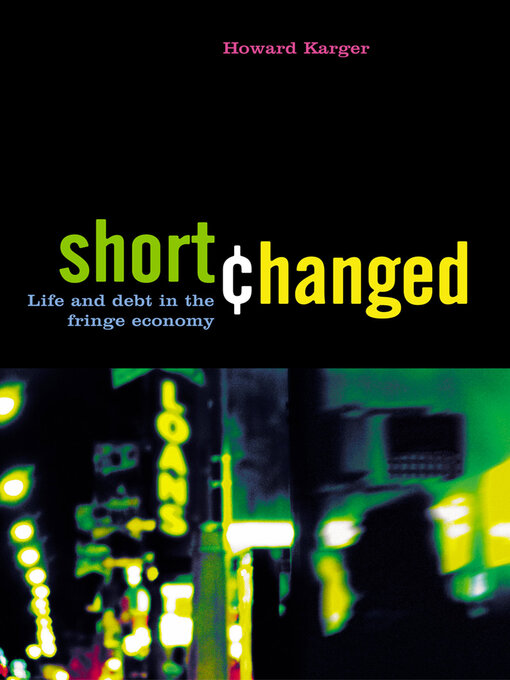Drive through a low-income neighborhood and you’re likely to see streets lined with pawnshops, check cashers, rent-to-own stores, payday and tax refund lenders, auto title pawns, and buy-here-pay-here used car lots. We’re awash in “alternative financial services” directed at the poor and those with credit problems. Howard Karger describes this world as an economic Wild West, where just about any financial scheme that’s not patently illegal is tolerated.
Taking a hard look at this fringe economy, Karger shows that what seem to be small, independent storefront operations are actually part of a fully-formed parallel economy dominated by a handful of well-financed corporations, subject to little or no oversight, with increasingly strong ties to mainstream financial institutions. It is a hidden world, Karger writes, where a customer’s economic fate is sealed with a handshake, a smile, and a stack of fine print documents that would befuddle many attorneys.
Filled with heartbreaking stories of real people trapped in perpetual debt, Shortchanged exposes the deceptive practices that allow these businesses to prey on people when they are most vulnerable. Karger reveals the many ways this industry has run amok, ruining countless people’s lives, and shows that it’s not just the poor but, more and more, maxed-out middle class consumers who fall prey to these devious schemes. Balancing compassion with a realistic awareness of the risks any business faces in working with an economically distressed clientele, Karger details hard-headed, practical recommendations for reforming this predatory industry.
-
Creators
-
Publisher
-
Release date
April 14, 2022 -
Formats
-
Kindle Book
-
OverDrive Read
- ISBN: 9781609943882
-
EPUB ebook
- ISBN: 9781609943882
- File size: 1090 KB
-
-
Languages
- English
-
Reviews
-
Publisher's Weekly
Starred review from September 1, 2005
Low-income consumers-and, increasingly, the financially strapped middle class-serve as prey in the predatory economic food chain of what Karger coins the "fringe economy." (Buy-here-pay-here outlets, check cashers, payday loan businesses, credit card companies and pawn shops that charge excessive interest rates, high fees, or inflated prices.) Unable to buy outright or qualify for reasonable lending terms, poor consumers fall into exploitative lease-to-own or subprime financing schemes that end up costing them vastly more than the fair market values of the goods and services financed. The lenders, increasingly partnered with mainstream banks, commonly charging triple-digit interest rates and pile on hidden or unnecessary fees. Because of their historically low-rent image, such businesses have long stayed beneath the radar, but the fringe economy's explosive growth and entrance into mainstream America (most notably with pre-paid cell phone plans and the appearance of check cashing services at well-known retailers such as Wal-Mart) have prompted consumer groups to call for reform. With rationality and calm restraint, Karger argues for responsible government regulation and stricter enforcement of usury laws, but concedes the "marketplace that has lost its moral center" can't be reformed by regulation alone. An eye-opening read in the school of Barbara Ehrenreich's Nickel & Dimed, Karger's book shines a bright light on the economy's darker side. -
Library Journal
Starred review from September 19, 2005
Low-income consumers-and, increasingly, the financially strapped middle class-serve as prey in the predatory economic food chain of what Karger coins the "fringe economy." (Buy-here-pay-here outlets, check cashers, payday loan businesses, credit card companies and pawn shops that charge excessive interest rates, high fees, or inflated prices.) Unable to buy outright or qualify for reasonable lending terms, poor consumers fall into exploitative lease-to-own or subprime financing schemes that end up costing them vastly more than the fair market values of the goods and services financed. The lenders, increasingly partnered with mainstream banks, commonly charging triple-digit interest rates and pile on hidden or unnecessary fees. Because of their historically low-rent image, such businesses have long stayed beneath the radar, but the fringe economy's explosive growth and entrance into mainstream America (most notably with pre-paid cell phone plans and the appearance of check cashing services at well-known retailers such as Wal-Mart) have prompted consumer groups to call for reform. With rationality and calm restraint, Karger argues for responsible government regulation and stricter enforcement of usury laws, but concedes the "marketplace that has lost its moral center" can't be reformed by regulation alone. An eye-opening read in the school of Barbara Ehrenreich's Nickel & Dimed, Karger's book shines a bright light on the economy's darker side.Copyright 2005 Library Journal, LLC Used with permission.
-
Formats
- Kindle Book
- OverDrive Read
- EPUB ebook
subjects
Languages
- English
Loading
Why is availability limited?
×Availability can change throughout the month based on the library's budget. You can still place a hold on the title, and your hold will be automatically filled as soon as the title is available again.
The Kindle Book format for this title is not supported on:
×Read-along ebook
×The OverDrive Read format of this ebook has professional narration that plays while you read in your browser. Learn more here.


